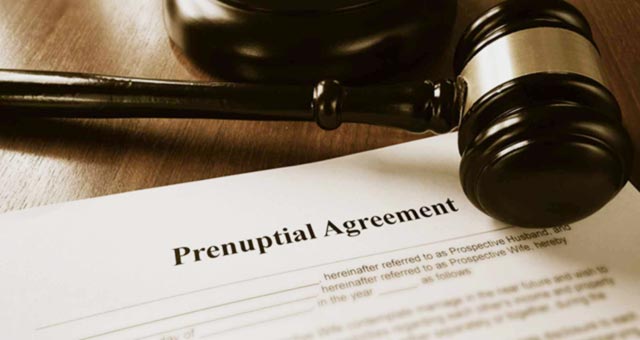
A prenuptial agreement, also known as a prenup, represents a written agreement created by partners who wish to marry. The agreement lists the assets and debts of both parties. It specifies what rights the parties possess to their properties and assets should their marriage ends in divorce.
Drafting the Agreement – Always Consult with a Lawyer
In Thailand, the Thai Civil and Commercial Code is used to draft prenuptial agreements. That is why you need to speak to legal counsel when you draft and file this type of contract. You should work with a lawyer who is familiar with the Thai legal code.
Culturally, in Thailand, prenups are important, as marriage serves to support couples financially and legally. That is why it is essential, especially if you are entering a marriage with numerous assets and holdings, that you create a pre-wedding contract. In most cases, a prenup will contain provisions that guarantee a minimum yet a fair share of a couple’s combined assets. Sometimes the allocation varies, depending on the length of the marriage.
What Should You Do If Your Partner Will Not Agree to Sign the Contract?
In some cases, one of the partners to a prenup may feel offended by the thought of a prenup. After all, this type of agreement does not sound positive when you are preparing to get married. However, you have to know where you stand financially and, for the time being, place sentiment aside. While this may sound harsh, you still need to legally protect yourself and your future spouse.
Reaching a Compromise
While no one wants to think their marriage could end in divorce, it is always a good idea to take certain legal measures, especially if one of the parties could be hurt financially. If the idea of a prenup is still off-putting, a compromise, in some instances, can be reached in the form of a sunset clause.
The clause is designed to end the prenup if a specific event happens. For example, you might agree to terminate the agreement upon the birth of your first child or when you celebrate your tenth wedding anniversary.
By adding the sunset clause, you can soothe the feelings of a partner who is offended by the thought of having a prenup created while he or she is in the midst of planning a wedding. The added clause shows that both parties are looking to a bright future, but still, wish to ensure their finances should something unexpectedly go wrong in the relationship.
Meeting the Prenup Requirements
Under Thai law, you need to meet certain basic requirements when creating a prenuptial agreement. These requirements include the following stipulations:
- The agreement must be written.
- Each partner must be represented by his or her own attorney.
- The prenuptial agreement must be signed by each party with two witnesses, at least 18 years old, witnessing the signing. This must be done when the marriage is registered.
- The prenup must be registered at the same local office where the marriage is registered.
Discussing the Agreement with Your Partner
While the choice of creating a prenup is wise and practical, discussing the contract with your partner may, at first, feel awkward if not uncomfortable. As a result, you need to handle the topic with discretion and understanding. To communicate your thoughts along these lines, legal experts suggest clients do the following:
- Discuss the subject in private. Do not use a public venue to talk about this type of plan.
- Let your future spouse know that including the prenup with your marriage certificate is just a part of financial planning – nothing more. Naturally, you don’t ever want to split. You are just taking your attorney’s advice, and adding the prenup as part of the marriage registration process.
- Stay positive. Listen to your fiancé or fiancée with an open mind. Use reason over emotion when talking about the subject.
Better yet, you may want to schedule a time when you can meet with a family law attorney to further discuss the contract and answer any questions. The idea is to show your future spouse that a prenup will protect both of you should anything happen in the marriage that could threaten your security.
Why You Can Benefit from a Prenup
Typically, a prenup provides a financial plan that can be managed during the course of a marriage or upon divorce. Doing so prevents major disputes, especially if the marriage dissolves. For couples with substantial holdings in property and assets, the document is very useful.
Having a prenup in force allows the division of assets to be managed fairly and equitably. It is also advantageous for couples of different nationalities who marry in Thailand. In some instances, a couple may agree to sign a postnuptial contract after their wedding takes place.
However, in the Thai legal system, a postnuptial agreement usually will not hold much weight. It is far better to add a prenup when you register the marriage. Any prenup that is entered in the Thai language cannot be changed after a couple weds. Unless the court authorizes a change, the Thai prenup’s terms must be followed.
Ensuring the Prenup’s Validity
This is important to remember if you are drafting this type of agreement. Once you create and establish the contract, you need to make sure you fully agree with the conditions of the agreement. Thai law places certain limitations on prenups that must be explicitly followed. The following list further elaborates on the regulations:
- The prenup should be written and signed by both parties to the contract.
- The prenup should always be signed on the day you register your marriage; otherwise, it will be considered null and void under Thai law.
- Both of the witnesses who witness the signing of the prenup are also used to witness the registration of the marriage.
- The prenup should always be attached to the marriage certificate upon registration. If either or both parties are under 20 years old, they must receive consent for the marriage from a parent, legal representative, or guardian.
- Legislation concerning prenups in Thailand requires that the agreement must be created in accordance with laws that emphasize good morals and public conduct.
What You Cannot Include in a Prenup
By following the laws that establish proper public behavior and good morals, you cannot design your agreement to suit your individual wishes or needs. For example, the following representations would be void if included in a prenup:
- A clause that requires a husband’s total salary be given to the wife.
- Wording that intimates that the agreement can be governed by statutes outside of Thailand.
- Wording that specifies each spouse’s debts. For instance, identifying a personal debt of both spouses to be a debt of the husband, or an obligation of the husband to be the debt of the wife.
- A clause that specifies, in cases of separation, that any assets acquired during the separation are personally owned. (While this addendum is considered void in the Thai legal system, it may be valid under certain state laws in the US.)
As you can see, you need to consult with a lawyer who is knowledgeable in Thai family law, particularly as it relates to prenups. That way, you can draft an agreement that will be recognized by the Thai courts and can be upheld if a future divorce takes place.
Prenups are Enforced under Thai Law
While you can pay for downloads of prenuptial agreements, it is always safer and wiser to seek help from an attorney experienced in drafting the agreements. After all, you defeat the purpose of creating the document in the first place if you don’t take this approach. A prenup is a good document to have on hand under the Thai legal system, as it will be enforced in this venue.
In essence, a prenuptial agreement helps you deal with any financial consequences should your marriage end in divorce. Basically, all couples have a prenup available to them through the legal system when they divorce. Having an agreement in force, however, takes care of any differences that may arise during a dispute.
Scenarios that Call for the Creation of a Prenup
Having a prenup in place is particularly important in the following scenarios:
- You have more money and assets than your partner.
- You earn more money than your fiancé or fiancée.
- You are remarrying and you have children from a previous marriage or own significant assets.
- The person you are marrying is coming into the marriage with a large amount of debt.
- You own a business or part of a business.
Basically, a prenup protects those couples who have property and assets that are substantial. A variety of scenarios may be used to reinforce the need for this type of legal contract.
Using the Prenup if You Divorce
If your marriage does end in divorce, you can either choose to file an uncontested/administrative divorce or a contested divorce. An uncontested divorce is easier to file, as the process goes quicker and costs less. Each party does not have to give a reason for ending the marriage, as their mutual agreement is enough.
Otherwise, a contested divorce is handled in court. If a prenup is used in this case, you can settle any problems with property disputes or disagreements about ownership. The same agreement can also support the filing of an uncontested divorce. When an administrative or uncontested divorce is filed, any conflict is kept to a minimum.
A prenup permits a couple to handle the division of marital property discreetly and privately. Seeking legal counsel should always be done during a dissolution of marriage, as couples may not be as objective as they would be in other legal situations. Once a settlement is reached, it is filed at the district office where the divorce is granted. Typically, with a prenup in place, a divorce between a Thai citizen and a foreign spouse is easier to settle. If the marriage has been registered in Thailand, the couple will normally opt for getting an uncontested divorce.
When Things Get Complicated
If you are a foreigner, you should consult with a lawyer before you file an uncontested divorce. This is important, as not all countries will recognize this type of divorce. Some countries, as well, will not recognize administrative divorces in certain instances. Again, you need to consult with an attorney to make sure you settle the divorce in compliance with the law, as it applies to you.
Whether you are drafting a prenup or wish to file for divorce, you need to refer to a legal firm that is knowledgeable in both subject areas. Use a firm that can answer your questions and will provide the best approach for keeping your interests protected during your marriage or upon divorce.
Going through the Process – Drafting the Prenup
Once you convince your fiancé or fiancée to agree to a prenup, you need to sit down and talk to an attorney. In this case, you and your partner will need to each retain the services of a lawyer. That way, you can negotiate the terms with more objectivity.
Making Sure Your Agreement is Legal
You may also secure the services of a notarial service lawyer – someone in the legal profession who can do the following:
- Verify the authenticity of the document’s signatures
- Confirm the identity of each of the contract’s parties
- Administer any affirmations or oaths
- Ensure that certain documents have been attested and certified
- Witness the signing of the agreement
Special note – Because of international laws in place, couples who engage a notarial service in Thailand may need to have notarized documents authenticated further at the country’s Ministry of Foreign Affairs.
Prenups and Mixed Marriages – Some Tips to Keep in Mind
Again, you will need to seek legal counsel if you marry a Thai citizen and are from another country. You should seek this type of help anyway. However, it is vitally important that you do so as a foreigner. You may not realize that certain items need to be added to the prenup that you might overlook in your homeland. The information below addresses some of these items.
Common Assets
If you don’t have a prenup in place, all of the assets acquired when you are married will be equally divided. This same principle is applied to non-married couples who have lived together for a long time. If you are not married and have this type of living arrangement, you should talk to an attorney. He or she can draw up an agreement that can be used to divide your assets in case of a split in the relationship.
Please contact us if you would like to consult a family lawyer regarding this.
Assets Acquired before the Marriage
Theoretically, assets that were acquired before the marriage registration should belong to the rightful owner. However, things are not always that simple, especially if you end up getting divorced. You should account for these items, as well, when you draw up a prenuptial agreement.
Please contact us if you would like to consult a family lawyer regarding this.
Alimony
While the court usually will establish the alimony during a divorce settlement, you may be surprised by the outcome. It is always better to play it safe rather than be sorry. Make sure you account for alimony payments when you draw up your prenup.
Please contact us if you would like to consult a family lawyer regarding this.
In Conclusion
The above information gives you a better idea about what to expect and how to act when you see a lawyer about drafting a prenup. Attaching this document to your marriage certificate during the registration process is part of sound legal and financial planning. While it may offend some partners, the document still should be looked at as added security.
Please contact a family lawyer if you would like a prenuptial agreement drafted for you.






I appreciated it when you shared that if you and your partner have agreed to prenuptial agreements, you have to talk and discuss with the right attorney to prepare the documents. My friend just mentioned the other day that she is thinking of doing a prenuptial agreement before she gets married in a few months in case anything happens to the marriage after she has spent so much on the wedding. I will suggest to her talking to her fiancee first and once he has agreed, find a reliable attorney to guide them through the process.